As part of a $930 million transaction, what federal officials say is the largest yet, NYCHA added the more than 2,000 apartments at the Edenwald Houses to its portfolio of units that have been converted to PACT, the authority’s initiative that partners with private developers to access funds for repairs.
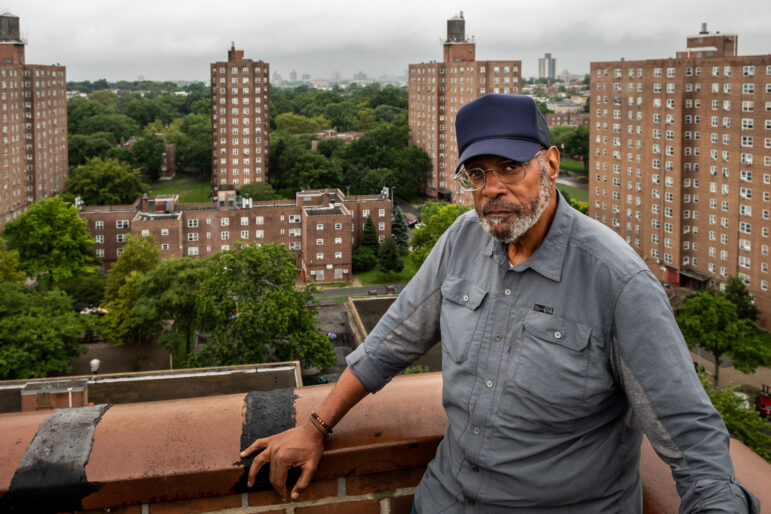
Adi Talwar
Edenwald Houses Tenant Association President Walter McNeil, who said watching PACT play out at the neighboring Baychester Houses was part of what made him want his own campus to follow that path. “I want that,” he recalled saying when renovations at Baychester wrapped.On a recent Thursday, two north Bronx tenants planted themselves in front of their respective buildings, greeting neighbors as they passed. Schieffelin Avenue separates their two homes , yet their experiences, in many ways, overlap: One man is looking at what could be his future while the other looks at his past.
Walter McNeil, a resident and tenant association president at the Edenwald Houses, is preparing for changes under NYCHA’s Permanent Affordability Commitment Together (PACT) program—a process Angelo Ocasio, a resident at the adjacent Baychester Houses, went through a few years ago.
This summer, in its biggest deal yet, NYCHA added the more than 2,000 apartments at Edenwald to its portfolio of 18,018 units that have been converted to PACT, the authority’s initiative that partners with private development firms to access funds for public housing repairs.
As part of the deal, tenants at the Edenwald Houses are promised upgrades to their units and campus, stemming from a nearly $1 billion financial transaction between NYCHA, its development partners and the U.S. Department of Housing and Urban Development (HUD) through the federal Rental Assistance Demonstration program.
RELATED READING: NYCHA’s RAD/PACT and Preservation Trust Plans, Explained
In total, Edenwald Houses—one of the oldest and largest public housing complexes in the city—will see an estimated $480 million in renovations, the equivalent of $236,000 per apartment, HUD officials said.
Units at the 70-year-old campus will be converted using a Project-Based Section 8 and Section 18 blend. Project-Based Section 8 vouchers are used when tenants are undergoing major repairs and renovations, while Section 18 is the “disposition” of public housing, either through demolition or the transfer to private management.
Edenwald Houses joins 62 other developments, including its neighbor Baychester, that previously went through the PACT conversion process, which includes three phases: predevelopment, construction and completion.
In the pre-development phase, private developers place their bids to take over day-to-day management of the properties, which NYCHA leases out to them. McNeil, who has lived at Edenwald for 49 years, said he was peppered with questions and concerns by hesitant residents about the plan.
“They don’t believe what they’re being told,” McNeil said. The tenant association president said he hears sentiments such as: “I think they’re trying to fool us,” and “seeing is believing.”
While elected officials have positioned PACT as an opportunity to leverage capital repair money for NYCHA, following years of government underfunding, many tenants remain skeptical of the plan, and of the involvement of private developers in public housing. A report from the group Human Rights Watch last year found eviction rates at two of the first PACT-converted NYCHA campuses were higher than that of the traditional NYCHA system.
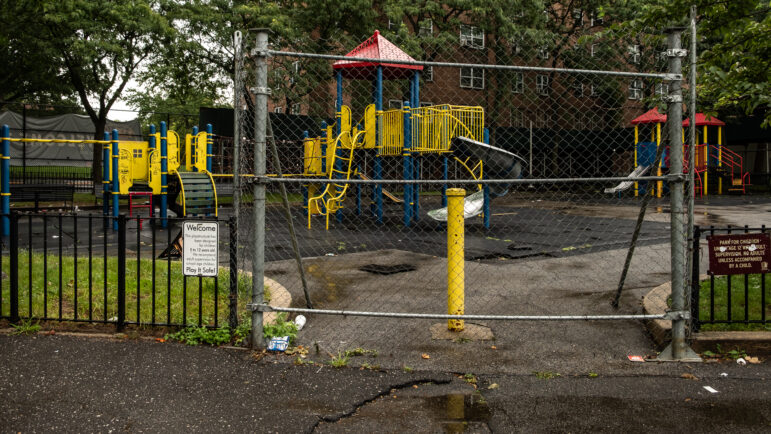
Adi Talwar
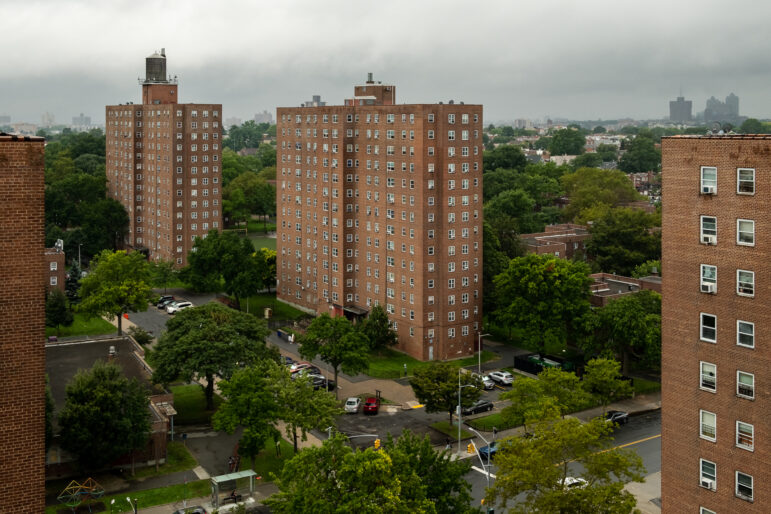
Adi Talwar
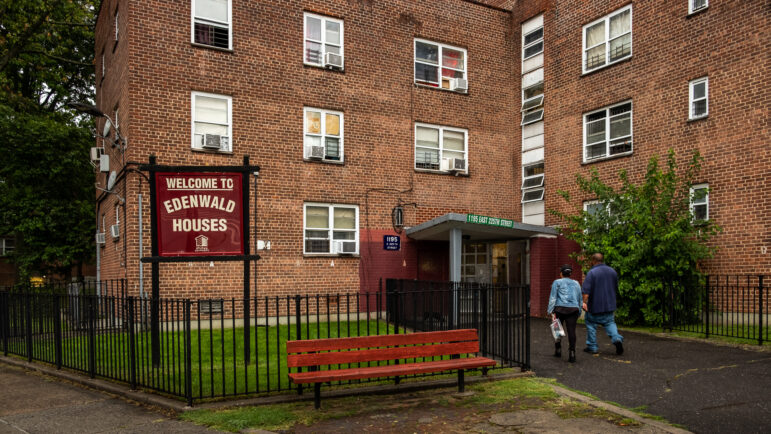
A playground closed off for repairs and other scenes from NYCHA’s Edenwald Houses, which is home to some 5,000 residents across 2,000 apartments. Photos by Adi Talwar.
One Edenwald resident told City Limits in passing that he knows nothing about the planned changes at the campus. McNeil, however, said outreach efforts have ranged from monthly meetings at the community center to the distribution of information packets on tenants’ doorknobs.
Construction is expected to take three years total, or six to eight weeks per unit, wrapping in the summer of 2026, according to a website set up by the private development company involved in the rehab. Some residents, mainly those whose apartments need lead abatement work, will be temporarily relocated to vacant units during the overhaul, the website states.
When words are not enough to convince skeptics, McNeil encourages tenants to go to the Baychester Houses to see the impact of PACT upgrades in real life. The neighboring NYCHA campus was part of a $261 million PACT renovation project, alongside the Murphy and Betances Houses developments.
“We try to give them a positive attitude and frame of mind so they can look toward a better future,” McNeil said.
HUD Regional Administrator, Alicka Ampry-Samuel,* said she visited Edenwald Houses in May with staff members from NYCHA, McNeil, and the private development team involved in the planned overhaul.
During the visit, the group toured a model apartment, which featured new floors, kitchen cabinets and stainless steel appliances. The bathroom was equipped with a new tub and vanity. Other renovations are slated to include a fully renovated senior center, a new laundry facility, and manicured greenspaces.
Ampry-Samuel said the aging Edenwald development will be modernized and that the upgrades will be “an opportunity for residents to be able to live in housing that they would be proud to live in.”
The selected partners for Edenwald are Camber Property Group, which helped spearhead the transaction at the neighboring Baychester Houses, Steward Alexander and Associates, Henge Development and L and M Builders Group.
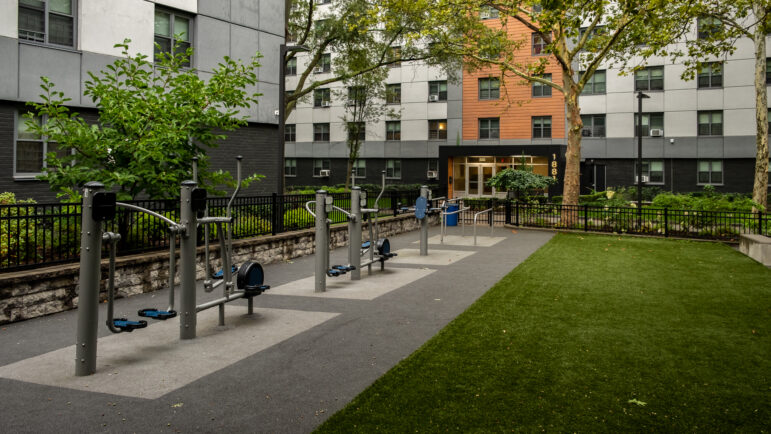
Adi Talwar
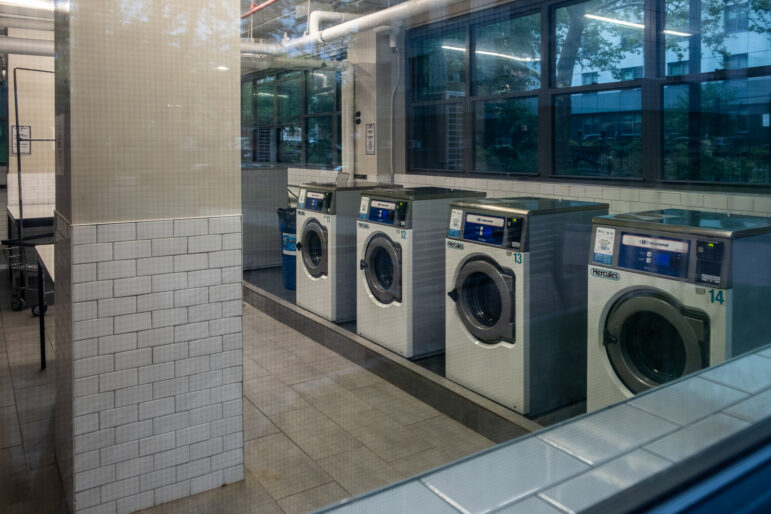
Adi Talwar
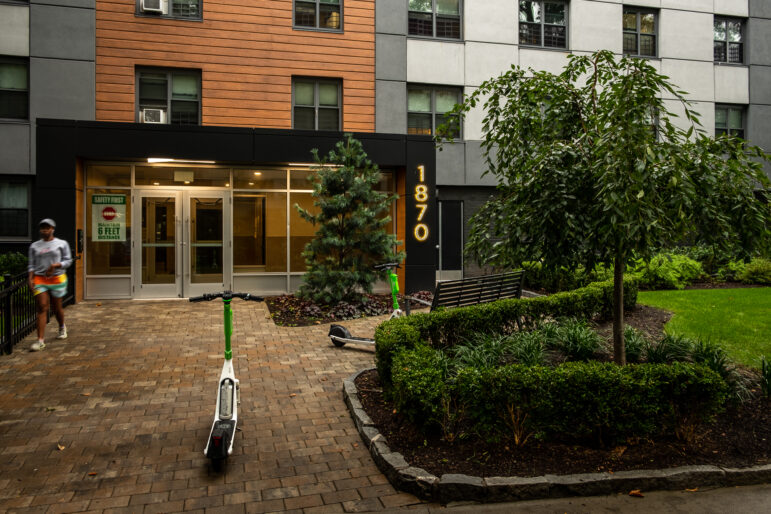
Adi Talwar
Baychester Houses, comprising 11 buildings, was part of a $261 million PACT renovation project, alongside the Murphy and Betances Houses developments, that finished in early 2021. Photos by Adi Talwar.
“We picked C and C Development because they were more attune with our development since they worked across the street,” McNeil said.
When construction at Baychester was completed in December of 2020, McNeil said he remembers pointing to the neighboring campus and saying, “I want that.”
Baychester Houses, comprising 11 buildings, now sports gray facades with brown wooden panels. In front are patches of grass, some with flowers and tall trees. A basketball court and playground are at the center of the buildings.
Ocasio, who lived at Baychester Houses for 56 years, said he too was initially wary of the promises being made, particularly about the long term care of the complex. But Ocasio said he now notices more workers tending to a single building—a noticeable improvement in campus upkeep.
Baychester is “cleaner and prettier,” overall, he added, compared to when NYCHA managed the buildings.
“It makes you want to sit here and relax,” said Ocasio, who was on a bench facing the Edenwald Houses at the time. “I didn’t do that before.”
To reach the reporter behind this story, contact Tatyana@citylimits.flywheelstaging.com. To reach the editor, email Jeanmarie@citylimits.flywheelstaging.com.
*This story has been updated since original publication to correct a spelling error in Ampry-Samuel’s name. City Limits regrets the error.








